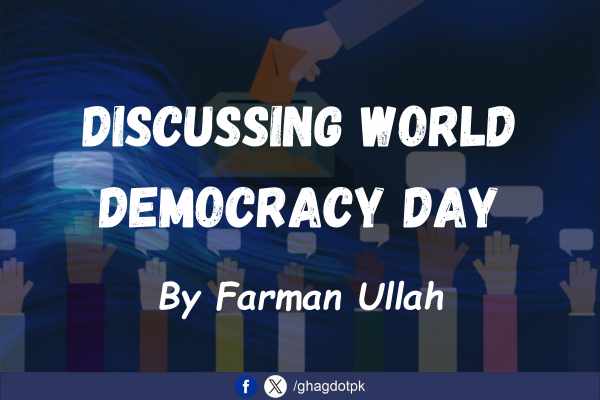By Farman Ullah
Abraham Lincoln’s iconic Gettysburg Address on November 19, 1863, defined democracy as “Government of the people, by the people, for the people” This phrase encapsulates the core principles of democracy: popular sovereignty, political equality, and accountability to the people.
The Birthplace of Democracy
The word itself was first used in ancient Athens, widely regarded as the birthplace of democracy. Derived from the Greek words “demos” (citizen) and “kratos” (power or rule), democracy has evolved over centuries through the collective efforts of citizens striving for a fairer society. Often, they had to fight to have their voices heard.
A Relatively Recent Phenomenon
Today, most of the world’s democracies are less than 100 years old. This highlights the relatively recent nature of democratic systems, which have only become widespread in the past century.
Promoting Democratic Principles
To promote and uphold democratic principles, the United Nations established World Democracy Day, also known as International Day of Democracy, on September 15, 2007. This year’s theme focuses on the role of artificial intelligence in good governance, highlighting both its benefits and risks in democratic processes.
The Role of AI in Democracy
United Nations Secretary-General António Guterres stresses the need for effective AI governance to harness its potential for societal betterment while mitigating its dangers. As AI becomes increasingly integrated into our lives, we must ensure its use aligns with democratic values.
The Importance of Democracy
Democracy has played a vital role in transforming the world from monarchies, empires, and conquests to popular rule, self-determination, and peaceful coexistence. Its importance cannot be overstated. By understanding the evolution and principles of democracy, we can work towards a more just and equitable society for all.
Democracy: The best form of Government
Democracy is widely regarded as the best form of government for several compelling reasons. Firstly, it is a more accountable form of government, as it is responsive to the needs and concerns of the people. This accountability ensures that the government remains transparent and responsible in its actions. Secondly, democracy improves the quality of decision-making by fostering consultation and discussion. This collaborative approach enables diverse perspectives to be considered, leading to more informed and well-rounded decisions. Thirdly, democracy provides a constructive method for addressing differences and conflicts, which are inevitable in any society. By establishing a framework for resolving disputes and negotiating compromises, democracy promotes social cohesion and stability. Lastly, democracy enhances the dignity of citizens by upholding the principle of political equality. This fundamental principle ensures that every individual has an equal voice and is treated with respect, regardless of their background or social status.






